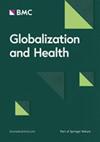斐济的粮食不安全、COVID-19 和饮食--对 500 多名成年人进行的横断面调查
IF 5.9
2区 医学
Q1 PUBLIC, ENVIRONMENTAL & OCCUPATIONAL HEALTH
引用次数: 0
摘要
粮食不安全与营养不足和慢性病发病率增加有关。这项研究的主要目的是在斐济中部的两个地区评估自我报告的粮食不安全状况以及 COVID-19 对粮食安全的影响,作为加强和监测粮食政策干预措施的更广泛工作计划的一部分。次要目的是探讨粮食不安全与盐、糖和水果蔬菜摄入量之间的关系。在斐济维提岛的德巴区和怀达穆达穆区随机抽取了 700 名成年人。由训练有素的研究助理进行访谈调查,并通过电子方式收集数据。收集的信息包括人口统计学和健康状况、食品安全、COVID-19 对食品安全的影响以及膳食摄入量。食物不安全评估采用了从斐济 2014/5 年全国营养调查中改编的九个问题,测量过去 12 个月中食物不安全的标志。此外还增加了其他问题,以评估 COVID-19 对回答的影响。为实现次要目标,我们使用 Intake24(计算机化膳食回忆系统)对受访者进行了 24 小时膳食回忆,从而计算出每个人的盐、糖、水果和蔬菜摄入量。加权线性回归模型用于确定食物不安全与盐、糖和水果蔬菜摄入量之间的关系。534 人参与了调查(回复率 76%,50.4% 为女性,平均年龄 42 岁)。75%(75.3%,95% CI,71.4% 至 78.8%)的人表示在调查前的 12 个月内经历过食物不安全。约有五分之一的人表示食物短缺(16.8%,13.9% 至 20.2%)、不得不不吃饭(19.3%,16.2% 至 22.9%)、食物种类有限(19.0%,15.9% 至 22.5%),或因无法满足食物需求而感到压力(19.5%,16.4% 至 23.0%)。67%(66.9%,62.9% 至 70.7%)的人报告说,由于 COVID-19,他们的食物更加不安全,并改变了他们的饮食习惯。然而,人们也报告了一些积极的变化,如建造家庭菜园(67.8%,63.7% 至 71.6%)、种植水果和蔬菜(59.5%,55.6% 至 63.8%)或尝试吃得更健康(14.7%,12.0% 至 18.0%)。食物不安全与盐、糖或水果和蔬菜的摄入量之间没有明显联系。参与者报告说,他们的食物不安全程度很高,盐和糖的摄入量超过了推荐值,水果和蔬菜的摄入量也没有达到推荐值,而且由于 COVID-19 的影响,他们的食物不安全程度变得更高。大多数参与者报告说,为了应对大流行病,他们建造了家庭菜园和/或种植了水果和蔬菜。在解决斐济的粮食不安全问题时,有机会促进这些活动的开展,这可能与太平洋地区和其他面临类似粮食不安全挑战的小岛屿发展中国家有关。本文章由计算机程序翻译,如有差异,请以英文原文为准。
Food insecurity, COVID-19 and diets in Fiji – a cross-sectional survey of over 500 adults
Food insecurity is associated with inadequate nutrition and increased rates of chronic disease. The primary aim of this study was to assess self-reported food insecurity and the perceived impact of COVID-19 on food security, in two regional districts of Central Fiji, as part of a broader program of work on strengthening and monitoring food policy interventions. The secondary aim was to explore the relationship between food insecurity and salt, sugar and fruit and vegetable intake. Seven hundred adults were randomly sampled from the Deuba and Waidamudamu districts of Viti Levu, Fiji. Interview administered surveys were conducted by trained research assistants with data collected electronically. Information was collected on demographics and health status, food security, the perceived impact of COVID-19 on food security, and dietary intake. Food insecurity was assessed using nine questions adapted from Fiji’s 2014/5 national nutrition survey, measuring markers of food insecurity over the last 12 months. Additional questions were added to assess the perceived effect of COVID-19 on responses. To address the secondary aim, interview administered 24-hour diet recalls were conducted using Intake24 (a computerised dietary recall system) allowing the calculation of salt, sugar and fruit and vegetable intakes for each person. Weighted linear regression models were used to determine the relationship between food insecurity and salt, sugar and fruit and vegetable intake. 534 people participated in the survey (response rate 76%, 50.4% female, mean age 42 years). 75% (75.3%, 95% CI, 71.4 to 78.8%) of people reported experiencing food insecurity in the 12 months prior to the survey. Around one fifth of people reported running out of foods (16.8%, 13.9 to 20.2%), having to skip meals (19.3%, 16.2 to 22.9%), limiting variety of foods (19.0%, 15.9 to 22.5%), or feeling stressed due to lack of ability to meet food needs (19.5%, 16.4 to 23.0%). 67% (66.9%, 62.9 to 70.7%) reported becoming more food insecure and changing what they ate due to COVID-19. However, people also reported positive changes such as making a home garden (67.8%, 63.7 to 71.6%), growing fruit and vegetables (59.5%, 55.6 to 63.8%), or trying to eat healthier (14.7%, 12.0 to 18.0%). There were no significant associations between food insecurity and intakes of salt, sugar or fruit and vegetables. Participants reported high levels of food insecurity, exceeding recommendations for salt and sugar intake and not meeting fruit and vegetable recommendations, and becoming more food insecure due to COVID-19. Most participants reported making home gardens and/or growing fruit and vegetables in response to the pandemic. There is an opportunity for these activities to be fostered in addressing food insecurity in Fiji, with likely relevance to the Pacific region and other Small Island Developing States who face similar food insecurity challenges.
求助全文
通过发布文献求助,成功后即可免费获取论文全文。
去求助
来源期刊

Globalization and Health
PUBLIC, ENVIRONMENTAL & OCCUPATIONAL HEALTH-
CiteScore
18.40
自引率
1.90%
发文量
93
期刊介绍:
"Globalization and Health" is a pioneering transdisciplinary journal dedicated to situating public health and well-being within the dynamic forces of global development. The journal is committed to publishing high-quality, original research that explores the impact of globalization processes on global public health. This includes examining how globalization influences health systems and the social, economic, commercial, and political determinants of health.
The journal welcomes contributions from various disciplines, including policy, health systems, political economy, international relations, and community perspectives. While single-country studies are accepted, they must emphasize global/globalization mechanisms and their relevance to global-level policy discourse and decision-making.
 求助内容:
求助内容: 应助结果提醒方式:
应助结果提醒方式:


